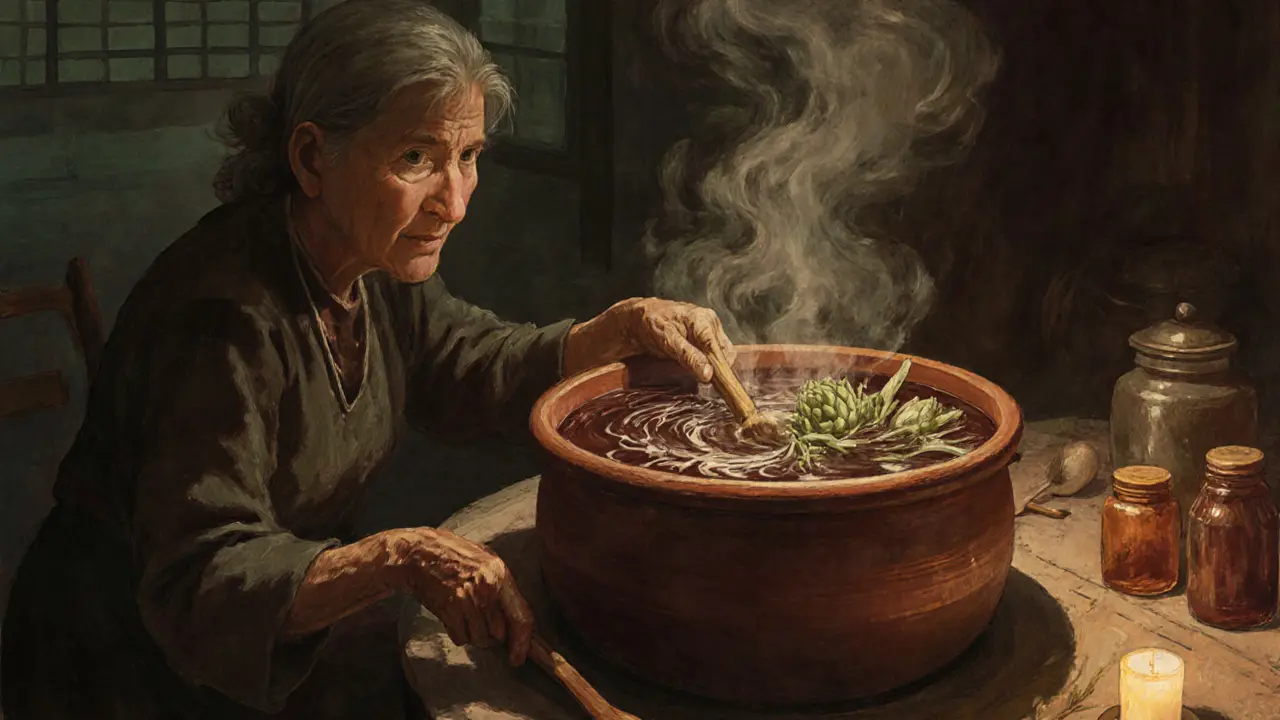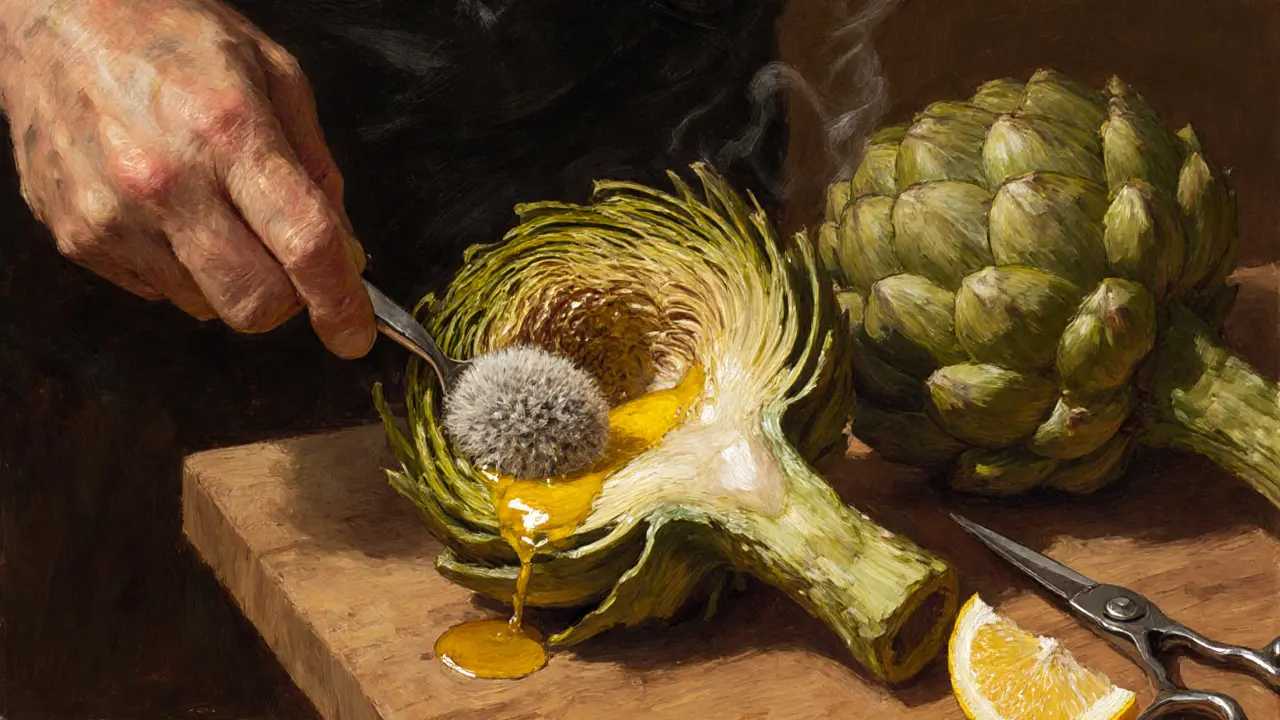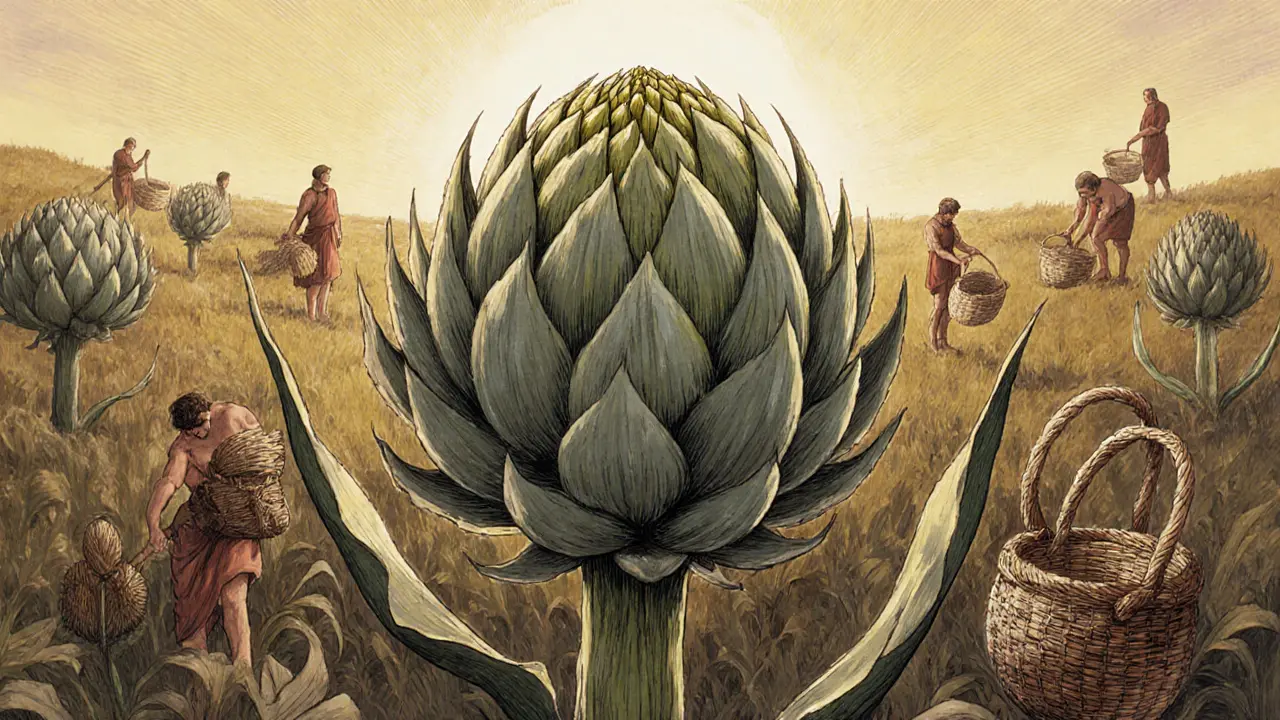What Exactly Is an Artichoke?
Most people think of artichokes as a fancy side dish, maybe something you see on a restaurant menu with melted butter. But artichoke is a thistle plant, Cynara cardunculus var. scolymus, grown specifically for its unopened flower bud. It’s not a root, not a stem, not a leaf-it’s the flower head, harvested before it blooms. Once it opens into that purple flower, it becomes too tough to eat. That’s why you never see artichokes in full bloom at the grocery store.
The edible parts? The thick, fleshy base of the leaves (called bracts) and the heart underneath. The fuzzy center, called the choke, is inedible in mature artichokes. If you’ve ever bitten into one and got a mouthful of prickly fibers, you know why preparation matters.
Artichokes are native to the Mediterranean. Ancient Greeks and Romans ate them. Today, Italy, Egypt, and Spain lead global production. In the U.S., almost all fresh artichokes come from California-Monterey County alone grows 70% of the nation’s supply. The plant grows tall, up to six feet, with silvery-green, spiky leaves. It’s not pretty, but it’s packed with value.
Why Artichokes Are Nutritionally Powerful
A medium artichoke has just 76 calories, zero fat, and no cholesterol. But what it lacks in calories, it makes up for in nutrients. One artichoke gives you:
- 10.3 grams of fiber (over a third of your daily need)
- 25% of your daily vitamin C
- 24% of vitamin K
- 22% of folate
- 15% of magnesium
- 14% of potassium
Compare that to broccoli: artichokes have 2.5 times more fiber. And they beat bananas on potassium-370mg per 100g versus 262mg. That’s not a typo. Potassium helps regulate blood pressure, and artichokes deliver it in spades.
But the real superpower isn’t just vitamins. Artichokes are loaded with antioxidants. One study found artichoke heart extract had 2.3 times the antioxidant power of blueberries. The compound cynarin, along with luteolin and silymarin, helps protect liver cells and supports bile flow-key for digesting fats. The European Medicines Agency even recognizes artichoke leaf extract as a traditional remedy for indigestion.
Artichoke Tea (Atisô): The Vietnamese Favorite
In Vietnam, they don’t eat the bud-they brew it. Atisô is the Vietnamese word for artichoke, and Trà Atisô (artichoke tea) is a popular herbal drink, especially in the south. People boil the whole flower head, leaves, and sometimes stems for 20 to 45 minutes. The water turns deep brown, bitter, and earthy. It’s not sweet. Most Vietnamese drinkers add sugar or honey to balance the taste.
On Tiki.vn, Vietnam’s biggest e-commerce site, 85% of reviews mention the bitterness as the biggest hurdle. But the same users also say they drink it daily for liver health, digestion, and detox. It’s not a fad-it’s tradition. The tea market in Vietnam is worth $8.3 million and growing at over 12% a year.
There’s science behind it. Artichoke leaf extract has been shown in clinical trials to lower total cholesterol by nearly 19% and LDL (bad cholesterol) by over 22% in 12 weeks. It’s not a miracle cure, but it’s a gentle, natural support for liver function.

How to Prepare an Artichoke Without Losing Your Mind
Here’s the truth: most people give up after one try. Why? It’s messy, takes time, and you can easily waste half the edible part.
Here’s how to do it right:
- Trim the stem to about 1 inch. Cut off the top third of the leaves-those are the sharpest.
- Use kitchen shears to snip the sharp tips off each remaining leaf.
- Rub the cut surfaces with lemon juice to prevent browning.
- Steam or boil the artichoke. Small ones (3-4 inches) take 25 minutes. Large ones (5-6 inches) need 35-40 minutes.
- Test doneness: a leaf pulls out easily.
- To eat: pull off leaves one by one, dip in butter or sauce, and scrape the flesh off with your teeth.
- When you get to the heart, scoop out the fuzzy choke with a spoon.
Beginners waste 35-40% of the edible portion. After five tries, you’ll cut that down to 15-20%. The trick? Don’t rush the steaming. Undercooked artichokes are chewy and frustrating. Overcooked? They fall apart. 35 minutes is usually the sweet spot.
Pro tip: If you hate the prep, buy frozen artichoke hearts. They’re already cleaned, trimmed, and ready to sauté, roast, or toss into pasta. They lose about 30% of vitamin C and 25% of polyphenols compared to fresh-but they’re 90% less work.
When and Where to Buy Artichokes
Fresh artichokes have two peak seasons: February to June and September to December. Outside those windows, they’re either scarce or imported-and expensive.
In U.S. supermarkets, expect to pay $2.99 to $4.99 per pound. Organic ones? Up to $6.99. The best ones feel heavy for their size, with tightly closed leaves. Avoid any with brown spots or dry, open tops. Those are old.
Storage matters. Wrap them in a damp paper towel, put them in a plastic bag, and refrigerate. They’ll last up to 7 days. At room temperature? Three days max.
Want to freeze them? Blanch the hearts first in lemon-water, then freeze in airtight containers. They’ll keep for a year and still taste great in soups or dips.

Who Benefits Most From Eating Artichokes?
Artichokes aren’t for everyone, but they’re especially helpful for:
- People with digestive issues: The fiber and bile-stimulating compounds ease bloating and indigestion.
- Those managing cholesterol: The plant sterols and antioxidants help lower LDL.
- Liver health seekers: Whether you drink Atisô tea or eat the heart, it supports detox pathways.
- People watching their blood pressure: High potassium + low sodium = natural balance.
But here’s the catch: if you’re on medication for cholesterol or liver conditions, talk to your doctor. Artichoke extract can interact with some drugs, especially statins or diuretics.
Also, if you’re allergic to plants in the Asteraceae family-like daisies, ragweed, or chamomile-you might react to artichokes. It’s rare, but it happens.
The Future of Artichokes: Spineless Varieties and Functional Foods
Artichokes are changing. In Italy, breeders developed the Asti Sorì variety-elongated, spineless, with a slight dip at the tip. No snipping needed. It’s easier to prep, and commercial use is growing by 18% a year.
Researchers are also looking at using the whole plant. Right now, we only eat about 30-40% of the artichoke. The leaves and stems? Usually thrown away. But new studies show those parts contain high levels of polyphenols and protein. They’re being tested for use in snacks, supplements, and even plant-based protein powders.
The European Food Safety Authority approved artichoke leaf extract as a novel food ingredient in April 2023. That means you’ll start seeing it in energy drinks, gut-health tonics, and functional snacks. Big food companies are watching.
Climate change could shake things up, though. Water shortages in the Mediterranean could cut production by 15-20% by 2040. That might push more artichoke farming to places like California, where irrigation systems are more advanced.
Final Thoughts: Worth the Effort?
Is it worth spending 30 minutes prepping an artichoke for a meal that lasts 10 minutes? For many, the answer is no. But for those who care about gut health, liver support, or just want a nutrient-dense, low-calorie food that’s unlike anything else on the plate-yes.
Atisô tea is the easy entry point. It’s cheap, simple, and deeply rooted in tradition. If you’re not ready to tackle a whole artichoke, start there. Brew a pot, add a little honey, and drink it warm. You might not taste the antioxidants-but your body will feel them.
Artichokes aren’t trendy. They’re tough, stubborn, and full of character-just like the people who eat them.
Can you eat artichoke leaves?
Yes, but only the fleshy base of each leaf. You don’t eat the whole leaf. Hold the leaf by the pointed end, dip it in sauce, and scrape the soft part off with your teeth. Discard the rest. The inner leaves near the heart are the most tender and flavorful.
Is artichoke tea the same as artichoke extract supplements?
No. Artichoke tea is made by boiling the whole plant-leaves, stems, and flower heads. Supplements are concentrated extracts, usually from the leaves, standardized to contain specific amounts of cynarin and other compounds. Tea is mild and natural; supplements are stronger and used for targeted health goals like cholesterol or liver support.
Why does artichoke make my urine smell weird?
That’s normal. Artichokes contain sulfur-containing compounds, similar to asparagus, that break down into smelly byproducts during digestion. It’s harmless and temporary. The smell doesn’t mean anything’s wrong-it just means your body is processing the phytochemicals.
Can you eat artichokes raw?
Technically yes, but it’s not recommended. Raw artichoke leaves are very tough and fibrous. The heart can be shaved thin and added to salads, but it’s still chewy. Cooking softens the texture and unlocks more nutrients. Steaming or roasting is the best way to enjoy them.
Are canned artichoke hearts healthy?
They’re convenient, but not as nutritious as fresh or frozen. Canned artichokes are often packed in brine or oil, which adds sodium or fat. Look for ones packed in water with no added salt. Even then, they lose about 30% of vitamin C and 25% of antioxidants during processing. Still, they’re a good option if you don’t have time to prep fresh ones.
How much artichoke tea should I drink daily?
One to two cups per day is typical for health benefits. In Vietnam, people often drink it after meals to aid digestion. Don’t overdo it-excessive amounts may cause stomach upset or interact with medications. If you’re using it for liver support, stick to one cup daily and consult a healthcare provider if you have existing conditions.

Ali Korkor
October 27, 2025 AT 23:09Also, frozen hearts are a game changer. No more messy prep.
Serena Dean
October 29, 2025 AT 07:53Pro tip: Add a slice of ginger and a dash of honey. Makes it feel like a warm hug.
James Young
October 31, 2025 AT 06:47Chloe Jobson
November 1, 2025 AT 19:56Just don’t confuse it with pharmaceutical-grade extracts.
Norman Woo
November 3, 2025 AT 10:26Andrew Morgan
November 4, 2025 AT 02:22But then I had a cup of atisô tea after and felt like my liver gave me a high five. So yeah. Worth it. Even if I’m a mess in the kitchen.
Roxanne Maxwell
November 4, 2025 AT 21:43Sean Huang
November 6, 2025 AT 01:28madhu belavadi
November 6, 2025 AT 05:31Michael Folorunsho
November 7, 2025 AT 11:12Dick Lane
November 7, 2025 AT 17:51I don’t know if it’s the tea or just hope. But I drink it too. Just to feel close to her.